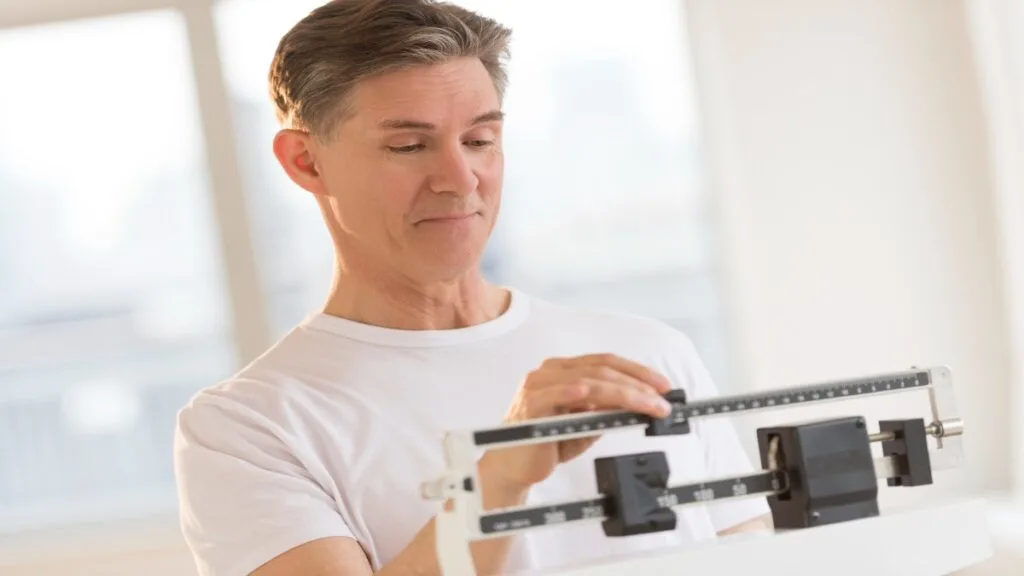If you want to know the average 5’1 weight for women and men, then this is the article for you.
By understanding the normal weight for a 5’1 female, you can see how your body weight compares and learn if you need to lose weight.
We’ll also talk about BMI, using real examples as our guide. Although imperfect as a tool, body mass index is still a reliable indicator of body fatness for many people.
Related Articles:
- How much should a 4’9 female weigh?
- How much should a 4’10 female weigh?
- How much should a 4’11 female weigh?
- How much should a 5 foot female weigh?
What is the average weight for a 5’1 female?

What is the average weight for a 5’1 female? The average weight for a 5’1 female is between 160 lbs and 165 lbs, which works out to between 72.57 kg and 74.84 kg in kilograms.
Naturally, due to being approximately 3 inches shorter than the average woman, a 5’1 female is also going to weigh a bit less than the 171-pound average as well.
Of course, given the wide variety of body shapes and body compositions that exist among women, there will be plenty of 5’1 ladies who weigh both more and less than 160 lbs.
The average weight for a 5’1 woman is simply the most common weight for a woman who is 5 foot 1 inch tall when you factor in all of the possible body weights and their frequency.
Related: Average female weight by height
What is the average weight for a 5’1 male?

Since a 5’1 man is around 8 inches shorter than the average male, the average weight for a 5’1 male is likely around 165 pounds or 75 kilograms.
Most of the time, an adult 5’1 man is going to weigh a lot more than a developing 5’1 teenager due to having more muscle and fat.
Although 165 lbs doesn’t seem that heavy, such a body weight is actually considered obese, meaning that any 5’1 individual who weighs 165 lbs should definitely seek to lose weight.
Related: Average weight of a man
What is considered a healthy weight for a 5’1 female?

A healthy weight for a 5’1 female is between 100 lbs and 130 lbs, which works out to 45.36 kg and 58.97 kg in kilograms.
Within this range, a 5’1 woman’s body weight is considered normal in terms of BMI.
While BMI can’t tell you how much fat you have on your body, it’s generally a decent indication of body fatness for those who don’t have lots of muscle mass.
Obviously, there’s a 30-pound weight range, which is quite generous considering that shorter individuals tend to weigh much less overall than their taller counterparts.
This weight range allows for women of different body types to be healthy, meaning that there’s no need to focus on one specific weight.
After all, 100 lbs is very slim indeed, even for a 5’1 woman. So naturally, most healthy 5’1 women are going to weigh closer to 130 lbs than 100 lbs, especially in today’s growing world.
Related: Is 5’1 short for a woman?
What is a good BMI for a 5’1 woman?

A good BMI for a 5’1 woman who wants to be healthy and in good shape is between 18.5 and 24.9, which is roughly in line with the above 100 lb to 130 lb weight recommendation.
Next, let’s look at some BMI examples so that you can see the precise body mass index for some different body weights at the height of 5 foot 1.
5’1 90 pounds
People who weigh 90 pounds at the height of 5 foot 1 are classed as underweight due to having a BMI of 17, as are those who are 5’1 and 95 lbs, seeing as they have a 17.9 BMI.
5’1 100 pounds
Your BMI (18.9) is within the normal range if you’re 5’1 and weigh 100 pounds. This is about as slim as a 5 foot 1 woman should be.
Additionally, if you’re 5’1 and 105 pounds, then you have a slim 19.8 body mass index, which is around 10 BMI points lower than average in the US.
5’1 110 pounds
Individuals who are 5’1 and who weigh 110 pounds have a 20.8 BMI, and people who are 5’1 and weigh 115 pounds have a 21.7 BMI.
5’1 120 pounds
Someone who is 5’1 and weighs 120 pounds has a 22.7 BMI, while a person who is 5’1 and weighs 125 pounds has a 23.6 BMI.
5’1 130 pounds
If you’re 5’1 and 130 pounds, this means that you have a BMI of 24.6. In a similar way, the body stats of 5’1 and 135 pounds mean that your body mass index is 25.5.
5’1 140 pounds
Women and men who are 5’1 and 140 lbs are considered slightly overweight due to having a BMI of 26.5. The same is true for people who are 5’1 and 145 lbs, seeing as they have a 27.4 BMI.
5’1 150 pounds
The physical body stats of 5’1 and 150 pounds mean that you have a body mass index (BMI) of 28.3. Similarly, those who are 5 foot 1 and who weigh 155 pounds have a BMI of 29.3, which is roughly average for an American.
5’1 160 pounds
If you are 5’1 and 160 lbs, you have a BMI of 30.2, and if you’re 5’1 and 165 lbs, you have a 31.2 BMI. Both of these body mass index scores are considered slightly obese.
5’1 170 pounds
Those who weigh 170 pounds and stand at the height of 5 foot 1 have a body mass index of 32.1, which is on the lower end of the obese classification. In a similar manner, men and women who are 5’1 and 175 pounds have an obese 33.1 BMI.
5’1 180 pounds
Are you 5’1 and 180 lbs? If so, you have a BMI of exactly 34. Similarly, if you’re 5’1 and 185 lbs, you have a rather high BMI of 35.
5’1 190 pounds
A person who is 5’1 and who weighs 190 pounds is obese because they have a BMI of 35.9. It’s the same story for people who are 5’1 and weigh 195 pounds because they have a 36.8 BMI.
5’1 200 pounds
People who are 5’1 and tip the scales at 200 lbs have a 37.8 BMI, which is called class 2 obesity. Additionally, people who are 5’1 and 205 lbs are also obese due to their 38.8 body mass index score.
5’1 210 pounds
If you’re 5’1 and 210 pounds, your BMI is 39.7 (class 2 obesity), and if you’re 5’1 and 215 pounds, your BMI is 40.6 (class 3 obesity).
5’1 220 pounds
Anyone who is 5’1 and 220 lbs is in the severely obese territory due to having a 41.6 body mass index. The same is true for people who are 5’1 and 225 lbs since they have a BMI of 42.5.
5’1 230 pounds
If you are 5’1 and 230 pounds, this means that you’re suffering from severe obesity due to your 43.5 BMI. Similarly, if you’re 5’1 and 235 lbs, then your 44.4 BMI means that you’re morbidly obese.
5’1 240 pounds
You have a BMI of 45.3 if you’re 5’1 and 240 pounds, and you have a BMI of 46.3 if you’re 5’1 and 245 pounds.
5’1 250 pounds
Those who are 5’1 and 250 lbs have a sky-high 47.2 BMI, while people who are 5’1 and 255 lbs have an excessively high BMI of 48.2.
5’1 300 pounds
Someone who weighs 300 pounds at the height of 5’1 is extremely obese due to their 56.7 BMI, which is over 25 points higher than average.
In conclusion: How much should a 5’1 female weigh for good health?

Most 5’1 females should weigh between 100 lbs on the very low end and around 130 lbs on the higher end.
This is a good general weight range that most 5’1 women will naturally fall into if they lose their excess body fat and lead a healthy lifestyle that includes sufficient exercise and a nutritious diet.
We prefer to give a weight range because we know that getting caught up over one specific body weight can be very counterproductive.
The truth is that there’s no one best weight for a 5’1 woman because, even at the same height, people still have different builds and frame sizes.
Similarly, you can have more body fat than another person—up to a point—while still being healthy. So don’t feel that you have to be super slim if you naturally have more muscle and fat on your body than others.
Overall, if the average weight for a 5’1 woman is similar to your own body weight, then you should try to lose weight so that you can have a healthier body composition.
References
- Straight, C. R., Berg, A. C., Reed, R. A., Johnson, M. A., & Evans, E. M. (2018). Reduced body weight or increased muscle quality: Which is more important for improving physical function following exercise and weight loss in overweight and obese older women?. Experimental gerontology, 108, 159–165. https://doi.org/10.1016/j.exger.2018.04.011
- Casanova, N., Beaulieu, K., Oustric, P., O’Connor, D., Gibbons, C., Duarte, C., Blundell, J., Stubbs, R. J., Finlayson, G., & Hopkins, M. (2021). Body Fatness Influences Associations of Body Composition and Energy Expenditure with Energy Intake in Healthy Women. Obesity (Silver Spring, Md.), 29(1), 125–132. https://doi.org/10.1002/oby.23034
- Olmsted, M. P., & McFarlane, T. (2004). Body Weight and Body Image. BMC women’s health, 4 Suppl 1(Suppl 1), S5. https://doi.org/10.1186/1472-6874-4-S1-S5

